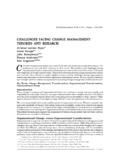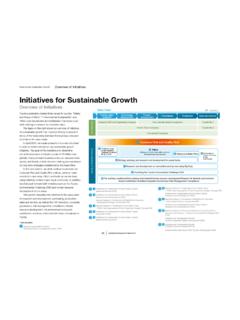Transcription of The Competitive Position of London as a Global …
1 The CompetitivePosition of Londonas a GlobalFinancial CentreThe Competitive Position of London as a Global Financial CentreNovember 2005 November 2005 The CompetitivePosition of Londonas a GlobalFinancial CentreZ/Yen Limited5-7 St Helen's PlaceLondonEC3A 6 AUTel: +44 (0) 207 562 9562 Web: 20051 The Competitive Position of London as a Global Financial Centre is published by the Corporation of London . The authors of this report are Mark Yeandle, Michael Mainelli and Adrian Berendt of Z/Yen Limited. This report is intended as a basis for discussion only. Whilst every effort has been made to ensure the accuracy and completeness of the material in this report, the authors, Z/Yen Limited, and the Corporation of London , give no warranty in that regard and accept no liability for any loss or damage incurred through the use of, or reliance upon, this report or the information contained herein.
2 November 2005 Corporation of London PO Box 270, Guildhall London EC2P 2EJ 2 Table of Contents Foreword .. 4 1. Executive Summary .. 6 2. Background .. 9 3. What Makes a Financial Centre .. 10 What is a Global Financial Centre? .. 11 How do Participants Choose to Place a Business in a Financial Centre? .. 13 Are there Contradictions? .. 15 Plus Ca Change? Well Maybe, and Remember We Told You So .. 16 4. Results .. 18 Availability of Skilled Personnel .. 18 Regulatory Environment .. 21 Access to International Financial Markets .. 23 Availability of Business Infrastructure .. 25 Access to Customers .. 27 A Fair and Just Business Environment .. 29 Government Responsiveness .. 31 Corporate Tax Regime.
3 33 Operational Costs .. 35 Access to Suppliers of Professional Services .. 38 Quality of Life Factors .. 40 Culture and Language .. 43 Quality and Quantity of Commercial Property .. 45 Personal Tax Regime .. 47 Final Rankings .. 49 5. Key Trends .. 52 Changes since 2003 .. 52 Future Changes .. 52 Comparisons with the 2003 Survey .. 53 Two Global Centres .. 55 Other Financial Centres .. 56 6. Conclusions .. 57 7. Appendices .. 60 A - Methodology .. 60 B - Survey Questions .. 62 C - Interviewees .. 65 Bibliography .. 66 3 4 Foreword Michael Snyder Chairman, Policy and Resources Committee Corporation of London It has been almost two and half years since the Corporation of London published its landmark research report Sizing Up the City London s Ranking as a Financial Centre.
4 That report attracted a significant amount of attention not only because it asked senior decision makers in the international financial services industry about the key components of Competitive advantage, but also because it asked them how the world s major financial centres ranked against these criteria. The City of London ranked very highly in the original study. However, given the rapid pace of change in the financial services industry since that report was published, we recently decided to commission a fresh exercise. This new report, produced by Z/Yen Limited, seeks both to measure how perceptions of the City s Competitive Position have changed since 2003, and to expand the scope of the exercise to embrace a wider range of factors and a greater number of centres.
5 I believe the key findings of this report are clear: London and New York have moved further ahead of Frankfurt and Paris as international financial centres. Indeed, those interviewed during the course of the research believe that there are only two genuinely Global financial centres - London and New York. Although Paris and Frankfurt are extremely important regional financial centres, and a number of other cities have been very successful in individual sub-sectors of the industry, the pre-eminence of the City and Wall Street is if anything even more pronounced than before. As was the case with the 2003 report, today s respondents believe that the availability of skilled personnel and the nature of the regulatory environment are the two most important Competitive factors affecting international financial centres.
6 Despite a host of pressures, particularly on the regulatory front, London has once again scored highly in both instances. There is, however, no room for complacency. It is clear that UK policy makers must continue to monitor the regulatory balance carefully and respond where necessary with proportionate action if London s relative competitiveness is to be maintained. 5 Looking ahead, respondents were divided as to whether there was scope for the emergence of a third Global financial services centre. They were, however, strongly of the view that if such a centre did arise it would be in China. The Corporation of London is acutely aware that China s role as an economic power has grown dramatically, and a vast market is being created for financial products and services.
7 We therefore plan to engage closely with the People s Republic and to respond to these challenges and opportunities for the City being created. Michael Snyder London November 2005 61. Executive Summary This study analyses the key factors that make a financial centre Competitive . It examines perceptions of four leading financial centres, London , New York, Frankfurt and Paris. The study also assesses how things have changed since a similar Corporation of London study in June The final rankings of the four financial centres shown in Chart 1 show that London and New York score well above Paris and Frankfurt as financial centres: Chart 1 Average Scores of the Financial Centres in 2005 York CityFrankfurtParisAverage Score Please note these scores exclude the ranking for Operational Costs as these were derived from a separate source (please see section below) The difference between London and New York is not statistically significant.
8 What is clear, however, is that these two financial centres have extended their lead over Frankfurt and Paris since 2003: Chart 2 Comparative Positions of the Financial Centres in 2003 York CityFrankfurtParis 1 Centre for the Study of Financial Innovation, Sizing up the City London s Ranking as a Financial Centre, Corporation of London (June 2003). 7 London and New York are the only two genuinely Global financial centres at present (we define a Global financial centre as one where a business is conducted between organisations from all over world using financial instruments from all over the world). Respondents believe that other financial centres such as Frankfurt, Paris and most of the Asian centres will remain as national financial centres and will not challenge London and New York as Global financial centres in the future.
9 The most important Competitive factors for financial centres in descending order are listed below: Table 1 Competitive Factors Ranked Factor of Competitiveness Rank Average Score Availability of Skilled Personnel 1 Regulatory Environment 2 Access to International Financial Markets 3 Availability of Business Infrastructure 4 Access to Customers 5 A Fair and Just Business Environment 6 Government Responsiveness 7 Corporate Tax Regime 8 Operational Costs 9 Access to Suppliers of Professional Services 10 Quality of Life 11 Cultural & Language 12 Quality / Availability of Commercial Property 13 Personal Tax Regime 14 The availability of skilled personnel is clearly judged as the most important factor with over 90% of respondents judging it to be either Very Important or Critically
10 Important. The regulatory environment is also seen as a crucial component of competitiveness. These two factors also ranked first and second in the 2003 study. London and New York scored highly for both these factors. Looking ahead, respondents believe that government responsiveness, corporate tax regime and personal tax regime is likely to be of greater concern to them over the next three years. Nobody we spoke to believes that London and New York will lose their positions as Global financial centres within the next ten years. Part of the continuing appeal of London to foreign companies is its cosmopolitan status. Frankfurt and Tokyo, for example, are primarily market places for domestic participants to which foreign players are granted access.





